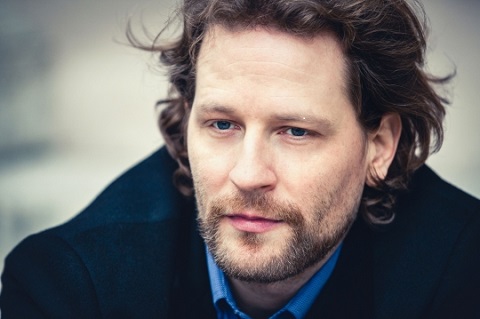Not surprisingly, Béla Bartók was the fulcrum of the evening: but the
programme was paradoxically both cohesive in spirit and diverse in medium.
We enjoyed Bartók’s Hungarian Peasant Songs, presented with a decidedly
Romantic slant, and an astonishingly transparent and detailed performance
of the composer’s one-act opera Duke Bluebeard’s Castle, both of
which were preceded by examples of the folk sources from which Bartók’s
invention sprang.
I feared that the first half of the concert was in danger of turning into a
lecture-recital, with the visceral experience of the music itself pushed
aside by scholarly ethnographical explanation. And, by the time we reached
the interval, my misgivings had not been entirely dispelled. Fischer began
by offering a brief introductory account of Bartók’s ethnographic research
and innovation, supplemented by some archive recordings. Then, we had the
‘live experience’ as folk singer Márta Sebestyén and three instrumentalists
performed some of the folk songs that had so stimulated Bartók’s musical
imagination in the early years of the twentieth century.
Sebestyén - confident, composed, wryly playful but absolutely honest - is a
master of her material; she makes no concessions, her tone quite hard but
direct, but she has a piercing gaze and was a captivating presence in her
deep red dress. But, why on earth did the RFH not provide surtitles? For
it’s difficult to respond and evaluate when one doesn’t have a clue what
situation, action or emotion is being conveyed in song. Moreover, given
that Sebestyén’s attire seemed to nod in the direction of ‘authenticity’,
why were her fellow musicians - playing folk violin, viola and double bass
- dressed in Western concert dress? (The sticky resin-capped fingerboards
of András Szabó’s viola and Zsolt Fejérvári’s double bass seemed a droll
rebuke to the context in which they were performing.) Perhaps I was alone
in sensing an air of constriction: I wanted these performances to break out
more exuberantly. In the song offered at the end of the first half, the
toes of violinist István Kádar did indeed seem to be twitching as nimbly as
his fingers, and Fejérvári’s snapping pizzicati and fingerboard-cracking
slaps did suggest that the music would flourish with freedom in the bar
afterwards. But, I felt this was an ‘experiment’ that did not quite come
off.
Fischer’s reading of Bartók’s Hungarian Peasant Songs (1933) - an
arrangement of 9 of the composer’s 15 Hungarian Songs for piano that date
from twenty years earlier - emphasised the lyricism of the melodic writing
and the richness of the orchestral colour. The opening unison was
strikingly dense and opulent in tone and if the string playing was
gloriously silky - and the players relished the characterful glissandi and
harmonics, leader Violetta Eckhardt sometimes turning to smile at her
section - woodwind and brass offered occasionally nasality to prevent the
performance slipping into the syrupy folk nationalism of Brahms or Dvořák,
and there were some darker colourings from the timpani and low brass.
Fischer was simultaneously alert to the details and free in gesture: flicks
and sways elicited precise responses by players who know their maestro
well.
It was a real joy to experience such an attractive orchestral sound, but it
was an extraordinarily vivid performance of Duke Bluebeard’s Castle, by turns crystalline and ample,
that brought the concert alive. Fischer himself recited (from memory) the
opening narration while simultaneously indicating the beat to the musicians
behind him. As the conductor gradually tightened the psychological screw,
the BFO made every single one of Bartók’s scintillating, brilliantly
defined sonorities tell, from ecstasy - the gleaming blast of golden C
Major at the opening of the fifth door - to tragedy: the pathetic, weeping
undulations of the lake of tears revealed behind the sixth - ‘What is this
water?’ Judith gasps, her incredulity tinted by celesta, harp and flutes.
Hungarian mezzo-soprano Ildikó Komlósi has - according to the programme -
sung the role of the naïve, curious Judith over 150 times. I have heard her
sing the role twice in the last two years: here at the
RFH
with Sir Willard White’s Bluebeard in a performance by the LPO conducted by
Charles Dutoit; and at the
Proms
in 2016 (again with Dutoit, conducting the RPO, and alongside John Relyea
as Bluebeard). This time, however, I missed the ‘freshness’ and ‘youthful
excitement’ I found in these previous interpretations. Certainly, there was
an assured sense of dramatic progression but Komlósi did not convince me
that she was an impetuous young bride, and her mezzo is not as steady as it
once was. That said, there was real poignancy in the quieter moments, as
when arriving at the castle, the disconcerted Judith questions, ‘What no
windows?’; and, the astonished horror of the realisation, ‘Your castle is
crying!’ was equalled for delicate expressivity by the cellos’ oscillating
string crossings. Komlósi has the power, too, to ride the orchestra tumult:
her demand that Bluebeard open the doors was spine-chilling and, though at
the bottom of her range, her insistence that she be given the keys and her
observation that ‘Your castle’s walls are bloody’ were perturbingly
penetrating.
Bass Krisztián Cser was a striking portrait of steely repressed emotion allied with an
almost unwelcome recognition of power - ‘You see the extent of my
Kingdom’ - and of his own capacity for violent domination.
There were hints of vulnerability too: ‘Judith, Judith’ Cser cried,
accompanied by a lovely cello solo, and at times the warm horns
suggested heart-feeling submerged and suppressed.
The Budapest Festival Orchestra pride themselves in being one of
Gramophone’s ‘top ten’ world orchestras.
On the evidence of this stirring and disturbing performance, the
accolade is fully deserved.
Claire Seymour
Ildikó Komlósi (mezzo-soprano), Krisztián Cser (bass), Budapest Festival Orchestra, Iván Fischer (conductor).
Royal Festival Hall, London; Tuesday 23rd May 2017.
